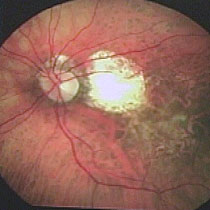2007年VOA标准英语-New Treatment Offers Hope for Age-Related Macul(在线收听)
Washington
10 July 2007
A recent study in the Journal of the American Medical Association shows that older people who carry certain genes are more susceptible to a loss of their central vision. That loss of sight is an advanced form of what's called Age-Related Macular Degeneration, or AMD. Researchers have identified specific genes that show a great risk for AMD, especially when combined with other factors, like smoking and obesity. VOA's Melinda Smith looks at some of the latest developments in the disease that is incurable and often causes blindness.
 |
| Stephen Pappas |
He treats them with a new drug called Lucentis, just approved in 2006 by the U.S. Food and Drug Administration.
Lucentis was specifically created for the treatment of "wet" macular degeneration, a condition in or around the retina resulting in the abnormal growth of blood vessels.
Athena Cokenias talks about the condition of her eyesight before she saw Dr. Pappas. "It wasn't bad until it really started bleeding."
Cokenias says she was unaware that the blood vessels behind her retina were bleeding. Because the loss of central vision can be permanent, Dr. Pappas says a quick diagnosis is critical. These patients need to be seen urgently by their ophthalmologist and once the ophthalmologist examines them, depending on the severity of their vision loss, typically these patients will undergo a retinal examination."
 |
| Image of the eye, Macular Degeneration, blood vessels behind retina |
Macular degeneration primarily affects Caucasian people, usually those with light colored eyes. Family heredity also plays a big part.
The Journal of the American Medical Association recently published a study of 1,500 white adults aged 55 to 80 with intermediate signs of the disease. During the six-year study, 281 of the participants were diagnosed with advanced AMD.
Researchers then identified specific genes and abnormalities among members of the smaller group that put them at greater risk. That risk was intensified when people smoked, were overweight, or experienced hypertension. Other factors included exposure to ultraviolet light and lack of a balanced diet full of dark leafy vegetables and fatty fish such as salmon and tuna.
So far, Lucentis has been an effective form of treatment. But another drug called Avastin is being compared in testing. Avastin has been on the market longer as part of the treatment for colon cancer and is cheaper to manufacture.
Until a future study proves one drug is better than another, Dr. Pappas says he is impressed with what Lucentis can do. "It was a drug that was specifically designed to penetrate the retina," he explains. "A lot of basic scientific research went into designing this drug -- to target it. It's actually an antibody fragment that can be injected also into the eye. And it can penetrate the retina. It's a very strong drug."
Patients who begin treatment with Lucentis often start with one injection a month, then taper off to longer periods in between, as their vision stabilizes or improves. But studies show the drug must be continued, or the patient's eyesight could regress or be lost.